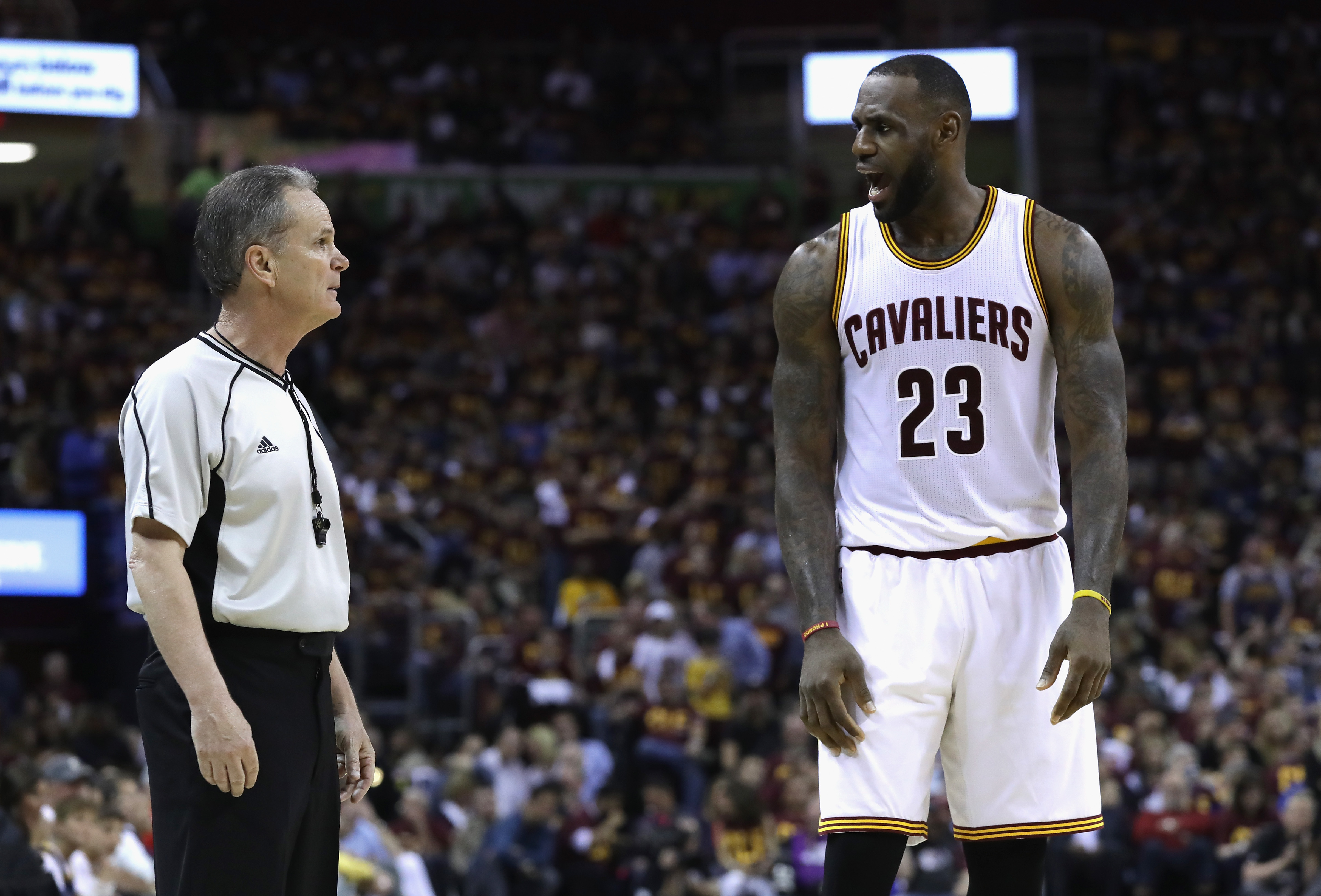In praise of imperfect NBA referees
"Transparency" and "perfection" are nice buzzwords — but when it comes to basketball officiating, they're practically vulgar


A free daily email with the biggest news stories of the day – and the best features from TheWeek.com
You are now subscribed
Your newsletter sign-up was successful
Have you ever made a split-second decision about what to order at a restaurant because your waiter was standing expectantly by the table? If what you settled on was only mediocre (you should never have ordered that catfish!), would it help if your dining companions released a comprehensive analysis the next morning of all the other menu options you could've chosen instead, and posted that post-mortem online for the world to see? Of course not — and it certainly wouldn't make last night's bland fish dinner taste any better.
So it's no surprise that last week, the National Basketball Association's referees union issued a statement asking the league to stop releasing its Last Two Minutes reports, which review the officiating decisions of the final minutes of close games and determine — via a breakdown made public the following morning — whether mistakes were made. The annotated play-by-play of the final minutes of the game lists each "officiated event" and determines it was either a correct call, an incorrect call, a correct non-call, or an incorrect non-call.
To understand why these reports are so problematic, take this example from a contested game in this year's Western Conference Semifinals between the San Antonio Spurs and the Oklahoma City Thunder. The Thunder edged the Spurs 98-97 in San Antonio to even the series at one game apiece and steal homecourt advantage. It was a critical, series-changing game after the Spurs had thoroughly embarrassed the Thunder in a Game 1 blowout. The L2M report for Game 2 revealed five separate incorrect non-calls in the last play of the game, including a missed shooting foul committed against Spurs forward LaMarcus Aldridge during his last-second shot attempt at the rim. Had officials called the foul for Aldridge (a career 80 percent free throw shooter), he would've been awarded two free throws that could've either tied the game or taken the lead. But they didn't, so he didn't, and the Spurs went on to lose the series in six games.
The Week
Escape your echo chamber. Get the facts behind the news, plus analysis from multiple perspectives.

Sign up for The Week's Free Newsletters
From our morning news briefing to a weekly Good News Newsletter, get the best of The Week delivered directly to your inbox.
From our morning news briefing to a weekly Good News Newsletter, get the best of The Week delivered directly to your inbox.
When the NBA implemented this review program in February 2015, the stated goal was to increase transparency in officiating. But the reports — and the principle behind them — are actually ruining the game. Accountability sounds nice, but there's a crucial caveat: The L2M reports have no bearing on actually changing any outcomes. What's done is done, and the only thing left to offer to the wronged team is righteous indignation.
What's more, the initiative places an undue amount of pressure on officials in tight games. While they should be focusing on making the right call in the moment, the knowledge that their actions will be dissected in a public forum the next day adds another anxiety-making element in deciding whether to blow the whistle. Think you see some deliberate, malicious follow-through on that hard foul at the rim? You'd better be sure you're ready to award that flagrant foul, or face the morning-after consequences. If officials are supposed to protect the sanctity of the game and the safety of its players, re-litigating every meaningful call in the court of public opinion the next morning is hardly the way to keep the objective motivations in focus.
Worse still is when this obsessive need for technical perfection makes the game actively worse. In Game 5 of the NBA Finals on Monday night, referees paused the action on at least three separate occasions to review a play and decide whether the foul in question was a flagrant foul — which awards the fouled team two free throws as well as possession — or a common foul. League rules previously dictated that instant replay could only be used to review a foul call if the infraction had been called flagrant when it occurred, but the NBA changed those conditions last year, allowing for fouls that had originally been called common fouls to be upgraded to flagrant after the viewing of an instant replay.
Some may say that perfection and consistency are worth the pain of pausing game play and subjecting refs to next-day castigation — that getting calls by-the-rulebook right is what matters most in the end. But allowing referees to frequently interrupt to consult an instant replay, disrupting the momentum and often-beautiful flow of basketball — especially when some of the league's most dynamic offensive players are on the court — is not worth this price. Basketball is fast-paced, near-constant motion, with 10 moving parts on the floor at any given moment. To allow each interaction between players to be reviewed both instantaneously and then, if the game was close, in the next day's L2M report, takes the impressive athleticism and skill inherent to the game out of the equation. It turns basketball from a joy to a grind.
A free daily email with the biggest news stories of the day – and the best features from TheWeek.com
"The league's actions to promote so-called transparency will cause more harm than good for the officials and the game," read the National Basketball Referees Association's statement calling for the end of the L2M reports. "If every possible infraction were to be called, the game would be unwatchable and would cease to exist as a form of entertainment in this country."
The refs are right.
To call every single infraction in fear of being outed for the non-call the next day is ruinous, as is setting the precedent that every single moment of physical contact can be subject to review. Would you rather watch LeBron James drive hard to the hole and slam in a thrilling dunk, or be whistled on every other possession for traveling? Would you rather watch Draymond Green fill up the stat sheet while playing every position, or sit out a Finals game because the league reviewed tape and retroactively upgraded one of his common fouls to a flagrant foul, resulting in a one-game suspension?
For the sake of the sport, let the officials be in charge of their own whistles, and let the players play.
Kimberly Alters is the news editor at TheWeek.com. She is a graduate of the Medill School of Journalism at Northwestern University.
-
 The ‘ravenous’ demand for Cornish minerals
The ‘ravenous’ demand for Cornish mineralsUnder the Radar Growing need for critical minerals to power tech has intensified ‘appetite’ for lithium, which could be a ‘huge boon’ for local economy
-
 Why are election experts taking Trump’s midterm threats seriously?
Why are election experts taking Trump’s midterm threats seriously?IN THE SPOTLIGHT As the president muses about polling place deployments and a centralized electoral system aimed at one-party control, lawmakers are taking this administration at its word
-
 ‘Restaurateurs have become millionaires’
‘Restaurateurs have become millionaires’Instant Opinion Opinion, comment and editorials of the day
